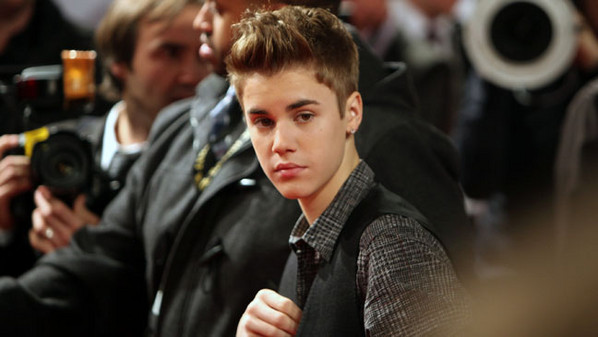Justin Bieber Sued By Creator of 'Joustin' Beaver' Game (Document)

RC3, a maker of Android apps, isn't about to be backed down by the legal demands of a teenager. The company has preemptively filed a lawsuit against Justin Bieber and claims the right to distribute a game, Joustin' Beaver, regardless of the singer's trademark and publicity right claims. The move comes two weeks after Bieber's attorneys sent the company a cease-and-desist letter that threatened litigation if the app wasn't promptly terminated.
In the lawsuit, RC3 admits that the game was inspired by Biebermania:
"In an effort to comment upon the Defendant's life, the Plaintiff, RC3 developed the aforementioned App entitled "Joustin' Beaver." The App, a video game, is a parody of the commercial success of the Defendant and any celebrity. The parody app portrays a beaver floating on a log down a river. The beaver presents with bangs, a lance, and a purple sweater. The beaver knocks 'Phot-Hogs' that are attempting to take his photograph into the river with his lance. The beaver also signs 'Otter-graphs.' The beaver also must dodge the 'whirlpool of success,' which will lead beaver out of control, while navigating the river."
By claiming that the game is a comment on Bieber's life and also invoking "parody," the game company hopes to convince a judge it has a First Amendment right to use the teen pop star's intellectual property.
According to the lawsuit, after RC3 received a cease-and-desist letter, the company attempted to explain its belief that the First Amendment protected it from any potential lawsuit from Bieber. The parties negotiated with each other, but couldn't come to an agreement.
RC3 is now seeking a declaration of its non-infringement, non-dilution, non-passing off, and non-misrepresentation of Bieber's trademark. Additionally, the company wants a judge to state that the game doesn't constitute misappropriation of Bieber's name for commercial purposes and that Joustin' Beaver is protected by the First Amendment.
This isn't the first time that someone in the entertainment industry has been troubled by a mobile app that allegedly existed at their expense. For instance, in 2009, WME agent Ari Emanuel demanded that all references to him be erased in an iPhone game app called SuperAgent.
That was before the U.S. Supreme Court sent a clear message that games should be treated like movies, music, and books and be accorded the same free speech protections.
The Bieber case, however, will likely turn on whether "Joustin' Bieber' is likely to cause confusion as to the source and endorsement of the young hearthrob. The game-maker will likely get a lot of attention for bringing this lawsuit and may cash in on the resulting publicity. If Bieber wins the case, however, the singer could claim the company's profits from making an exploitation.
Here's a copy of the complaint:
Add your comment. Join the conversation!
The best of Funrahi, delivered
Hollywood News Roll
Bollywood News Roll
- FeaturedTom Arnold Finally becomes DAD at Age 54
- FeaturedDrew Barrymore and Adam Sandler come together for Warner Bros. Romantic Comedy
- Featured'Harlem Shake': Original Artists Seek Payment for Unlicensed Sampling
- FeaturedSteven Spielberg Announces a Film set alongside India, Pakistan Border
- FeaturedOz's Final Domestic Opening Figures: $79.1 Million
- Tom Arnold Finally becomes DAD at Age 54
- Steven Spielberg Announces a Film set alongside India, Pakistan Border
- Celine Sallette and Raphael Personnaz Most Promising Actors of French Cinema
- Hollywood's Funny Tweets About L.A. Earth Quake
- Sybil Christopher, First Wife of Richard Burton, Dies at 83
- Supreme Court rules in favor of Theater Owners (NATO); Lifts ban on Large Soda
- MTV Movie Awards New TV Spot: Rebel Wilson, Channing Tatum's Dangerous Drive
- More Daily News
- David O. Russell's Next Strikes Theaters in December
- Michael Fassbender Exits Natalie Portman's 'Jane Got a Gun'
- 'Star Trek Into Darkness' New Teaser -- No small and troll sequences; Full of KICK-ASS action
- Matt Groening dismisses all rumors about 'Simpsons 2' Movie
- SXSW 2013: Loves Her Gun premieres a new poster
- 'After Earth' Trailer: Will and Jaden Smith Go on the Ultimate Father-Son Bonding Trip
- Michael Arndt is All Set to Re-write 'Hunger Games' Sequel - 'Catching Fire'
- More Movie News
- 'Harlem Shake': Original Artists Seek Payment for Unlicensed Sampling
- All Is Well between Tina Fey and Taylor Swift for now!
- Justin Timberlake Says "I Love Kayne West" on Late Night Show
- Madison Square Garden Co. Sells 2% Stake in Live Nation Ent. for $44 Million
- Quincy Jones' 80th Birthday Party to Broadcast Live on AXS TV
- A Indie Folk Singer has a message for Justin Bieber
- Kid Rock Teams With Detroit Symphony Orchestra for Benefit Concert
- More Music News
- Warner Bros. buys the rights for Julie Kibler's novel 'Calling Me Home'
- Drew Barrymore and Adam Sandler come together for Warner Bros. Romantic Comedy
- Legendary Pictures to present a trilogy based on Superpower Thriller Novel 'Brilliance'
- Universal Settles 'Fifty Shades of Grey' Porn Parody Lawsuit with Smash Pictures
- Adam Driver in talks with Warner Bros. to join the cast of 'This Is Where I Leave You'
- Millennium Entertainment Signs Deals for 'Hell Baby' All Media Rights for U.S.
- Nancy Meyers Inks Deal with Sony Pictures for a Untitled Romantic Comedy
- More Industry News